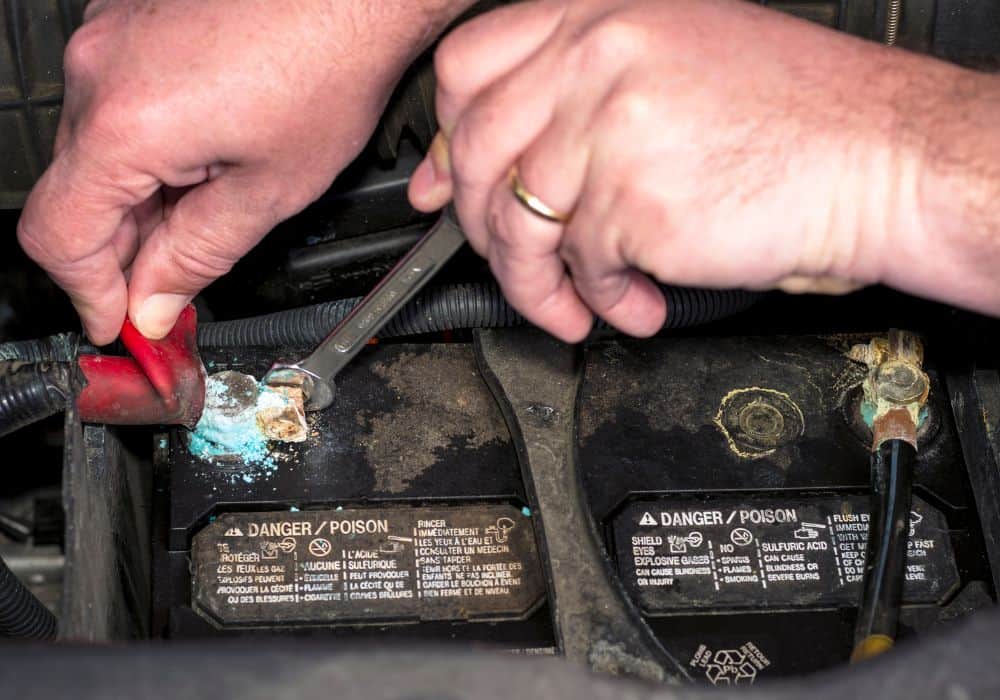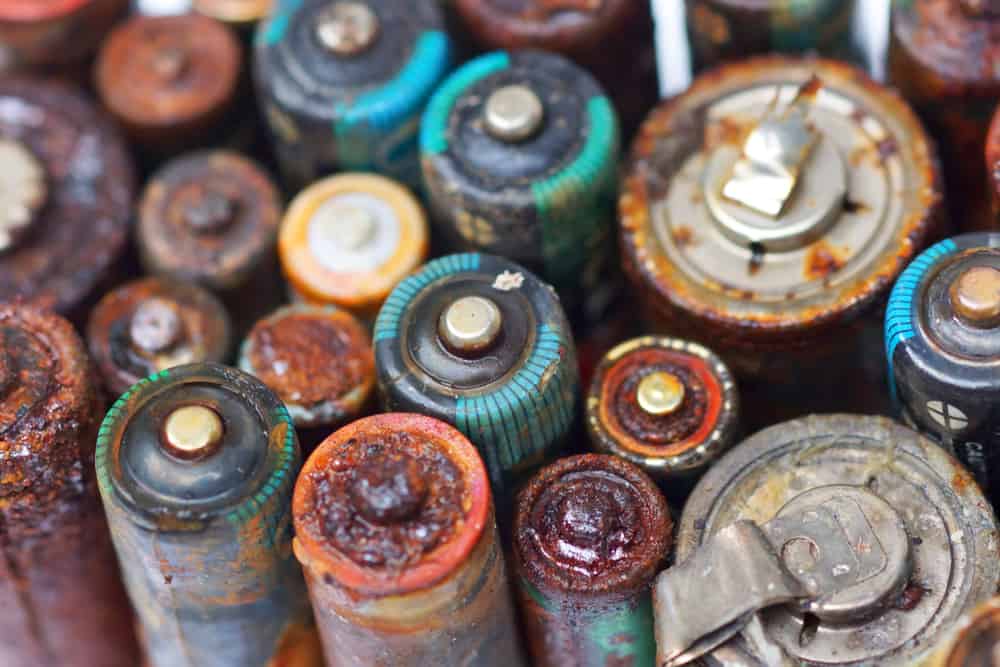We use batteries every day in our lives. We have them in our cars, cell phones, our laptops, TV remote controllers, and a multitude of other devices. While batteries are perfectly safe to use most of the time, occasionally they can become damaged and leak acid. What happens if the battery acid comes to contact with the skin?
In this article, we explain what battery acid does to the skin as well as how the affected area should be treated. We will also share tips on how to handle batteries safely.
Table of Contents
Why Do Batteries Have Acid?
Batteries have acid because they could not function without it. Most batteries have three key parts. The anode, which is the negative electrode, is usually made of sponge lead. The cathode, made of lead dioxide, is the positive electrode, and the third component is the electrolyte.
The anode sends electrons to the circuit that is external to the battery and powers the device connected to it. After the electrons have gone around the external circuit, they are received by the cathode. The electrolyte facilitates this ionic conduction around the internal and external circuits.
When you use the battery, the acid in the electrolyte will get to work reorganizing the ions. During this process, it becomes less concentrated and coats the lead plates of the two battery terminals.
Over time, this process decreases the area where electrochemical reactions can take place as the ions are used up. When the ions are used up, the battery needs to be replaced or recharged.
Types of Acidic Batteries
Batteries need acid to work and different types of batteries have different types of acid. Alkaline batteries, which are common household batteries, have potassium hydroxide, which is also known as lye. Technically, this is not an acid, but a strong base. However, it can still cause chemical burns.
Lead batteries, such as car batteries, have sulfuric acid. Sulfuric acid can cause damage to the eyes and burn skin on contact. Another type of battery used in, for example, mobile phones, are rechargeable lithium-ion batteries.
These types of batteries can cause injuries and be a fire hazard if they are not stored correctly, if they are overcharged, or become overheated.
What Happens if Battery Acid Comes in Contact With Skin?

If your skin comes to contact with acid from a battery, it will usually only damage the contact area. How severe the damage from the acid depends on how long it remains in contact with the skin. It will also depend on the strength and type of the acid. Sometimes, the reaction may be immediate, other times the symptoms will appear later.
However, all battery acids are highly corrosive substances and can cause excessive damage. When the skin has come into contact with acid, you may experience several or all of the following symptoms:
- Your skin may turn black.
- You may get blisters in the affected area.
- You might experience a burning or itching sensation.
- There may be a lot of pain.
- Irritant contact dermatitis is a condition that can cause irritation and redness on the skin.
- The affected area might tingle or you might experience numbness.
- The longer the acid stays on the skin, the more severe complications the chemical burns will cause. These include infection, loss of toes or fingers, severe pain, scarring, and emotional issues.
Other Damage From Battery Acid
While battery acid is most likely to damage the skin, especially the skin on your hands, it can cause other bodily damage too if inhaled or ingested or if it comes into contact with eyes or lips. If this happens, you may notice some of the symptoms listed below.
- Coughing, shortness of breath, or other difficulty breathing; sulfuric battery acid especially can be very damaging to the lungs
- Weakness, dizziness, or fainting
- Headaches
- Eye damage can include impaired vision or in extreme cases, blindness
- Irregular heartbeat or a cardiac arrest
- Low blood pressure
- Muscle spasm
- Seizures
- Severe internal damage, which is why you must contact the emergency services immediately if battery acid is ingested or inhaled.
- Ingesting battery acid can, without the correct treatment, lead to death.
What Should You Do if Battery Acid Comes Into Contact With Skin?

How to treat the skin if it has come into contact with battery acid depends on the type of acid. That is why it is important to know what type of battery you are dealing with because as we explained above, different batteries have different acids.
When helping someone who has had battery acid spill on them, always wear protective gloves to protect yourself.
Alkaline
If possible, remove the jewelry and clothing from the affected area. Be careful not to spread or touch the acid. If the acid has spilled on clothes, it is better to cut the material away rather than dry take it off. This could spread the acid to other parts of the body.
Use clean water to rinse the area for twenty to thirty minutes. Avoid hard spray as this can cause additional damage. Ensure the water is running off the skin rather than pooling. Do not wipe or rub the area. When you have done this to limit the damage, contact a medical professional to get the burn checked and dressed.
Sulfuric
Unlike with alkaline batteries, you should never use plain water to rinse sulfuric acid from the skin as this can make the symptoms worse. You need to make a solution by mixing soap with warm water. It will sting, but keep rinsing the affected area until the acid has been completely removed.
Follow Up Action
You should always call Poison Control even if the chemical burn is a minor one. Tell them the type of battery, the type of battery acid, and the details of the accident. They will be able to give you further information on how to treat the injury.
If the acid has caused major burns, the patient is unconscious, or is having serious symptoms such as difficulty with breathing, seizures, or chest pain, you should call the emergency services without delay so the injured person can get medical attention as soon as possible. Do this first before attempting any first aid.
Risks Related to Lithium-Ion Batteries
Like any battery, lithium-ion batteries are perfectly safe when kept in good condition and used and charged correctly. However, if they become damaged, there are certain risks users need to be aware of.
Lithium batteries can, under certain conditions, become intensely hot. This may cause them to burst into spontaneous fire and emit toxic gas and smoke. If a lithium-ion battery causes a fire, you should call emergency services immediately.
Safe Battery Handling

To minimize the risk of accidents with battery acid, it is important to handle them safely. When using rechargeable batteries, it is always best to charge them with a charger from the same brand. You should follow the manufacturer’s guidelines on the depth of discharge and never let your batteries overcharge.
It is normal for the batteries or the charger to become warm while charging. This is caused by the flow of fresh power into the cells. However, if the battery or the charger becomes unusually hot, discontinue the charge and get the battery and charger checked.
Battery Leaks
You should check the batteries for leakage, which can occur if the battery is left in an unused device. It can also be caused by improper contact. If there is a chemical discharge, do not touch the battery. Remove it safely, for example with a toothpick, and dispose of it at a battery recycling point.
Storage
Batteries should be stored in a dry and cool place and preferably somewhere high especially if there are children in the household. Avoid storing them with metal objects as that can cause the battery to short-circuit. Keep batteries, especially small ones that could be swallowed, out of children’s reach.
How to Dispose of Batteries Safely
You should never throw batteries into your normal garbage bin. Batteries damage the environment so it is important to dispose of them correctly. You need to check with the local authority how this is done in your local area. Most places will have collection points for the safe disposal of old batteries.
Summary
If battery acid is spilled on the skin, you must take immediate action. It is important to know the type of battery as different types of battery acid require different treatments. While alkaline acid can be rinsed with water, sulfuric acid needs to be rinsed with soapy water.
The exposure to battery acid can be minor or it may be very severe. Mild cases can usually be treated with first aid. However, you should still contact medical services to ensure correct follow-up care to prevent scarring, infections, or other long-term damage.
After reading this article, if you have remaining questions about battery acid damage to the skin, you can write your questions in the comments box.
